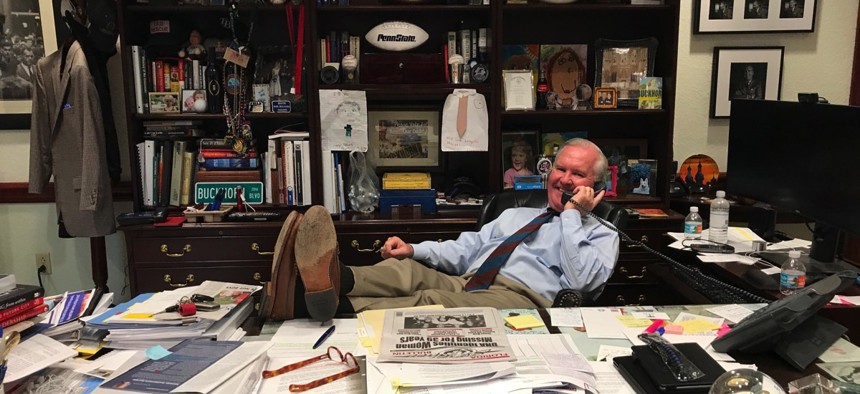Tampa Mayor: Florida Preemption an ‘Assault on Local Governance’ Like Never Before

Tampa Mayor Bob Buckhorn speaking with Route Fifty on Thursday. Ashley Bauman / Tampa Mayor's Office
“They’re trying to throttle the goose that’s laying the golden egg,” said Bob Buckhorn, who fears conservative legislation is deterring potential residents from thriving cities.
Editor’s Note: This is the second in a semi-regular series of Route Fifty features on the impacts of moves by state governments to preempt local government rules and regulations.
Tampa Mayor Bob Buckhorn has never before witnessed an “assault on local governance” like the one currently underway in Florida, and he’s been around City Hall since 1987.
For eight years, Buckhorn worked as special assistant to then-Mayor Sandra Freedman, before sitting on the Tampa City Council from 1995 to 2003.
After an eight-year stint in the private sector, he was elected mayor in 2011 and re-elected in 2015 with 95 percent of the vote.
“I have seen Tampa emerge from a small, relatively industrial port city to become the economic engine leading Florida out of the recession and that, for any corporate relocation, is top of mind,” Buckhorn told Route Fifty in a phone interview. “It’s been an amazing transformation of this community.”
But Florida’s Republican-controlled state government has made several moves to preempt the powers of local government, something Buckhorn, a Democrat, said threatens to undo the private sector-fueled prosperity and growth that cities like his are fostering.
Metropolitan areas—with their money, jobs and intellectual capital—drive the U.S. economy, but the Florida GOP, Buckhorn said, has attempted to limit their ability to act on everything from gun violence to civil rights to public rights of way to tax increases.
Preemption was a topic of major discussion at the Florida League of Cities annual conference in Orlando, as Route Fifty recently reported.
Florida state law prohibits city or county governments from doing anything that might impact a resident’s ability to buy or own a gun by leaving officials open to personal, as opposed to corporate, lawsuits if they attempt to pass policies curtailing the sale of high-capacity magazines, imposing wait periods on firearm delivery or requiring background checks prior to their sale.
Last legislative session saw several proposals to curb cities’ ability to raise property taxes, issue additional debt and establish community redevelopment agencies, including H.J.R. 7105 creating a 2018 ballot measure allowing voters to decide whether to cut local property taxes an average of $275 a year. Some were defeated, but Buckhorn expects renewed attempts next year in an era of political statements fanned by the conservative-leaning American Legislative Exchange Council and organizations funded by the Koch brothers.
“It is coming from a party claiming to believe that government closest to the people is the most effective—until we do something they don't like,” Buckhorn said. “They’re trying to throttle the goose that’s laying the golden egg.”
Tampa’s mayor knows the pattern isn’t unique to his city, or his state for that matter. He pointed to a few examples, including Miami Beach Mayor Philip Levine, whose city is currently engaged in a legal battle with the state over an attempt to raise the local minimum wage.
North Carolina and now Texas have seen Republicans push to exclude LGBT protections from local nondiscrimination ordinances, and Buckhorn said he would not be surprised if Florida follows suit. Tampa included such protections in its 1992 human rights ordinance.
Then there’s Airbnb and other short-term rental platforms—which Florida prevents cities from regulating—plus Uber, Lyft and other disruptive technologies and services, which Buckhorn said he supports but wants the flexibility to deal with in a way that’s appropriate for his city.
Mayors in Florida rallied against the worst instances of preemption last legislative cycle through op-eds and warning delegations of the harmful local effects, Buckhorn said, but elections matter, and gerrymandered districts mean Republican incumbents are more worried about their primary opponents from the far-right than center-left challengers.
“It’s like a cult,” Buckhorn said of the political atmosphere in Tallahassee. “The Senate has been able to stop more of the bad stuff because they tend to be more pragmatic and grown-up.”
In attending U.S. Conference of Mayors annual meetings, Buckhorn finds it’s the states where one party controls the governorship and both legislative houses—government “trifectas” of which Republicans hold 25 and Democrats six—where preemption is worst. State preemption of local government is on the rise categorically across the country, according to a recent National League of Cities report.
Violence in Charlottesville, Virginia over the issue of Confederate statue removal occurred months after conservative Alabama lawmakers passed legislation preempting monument relocation efforts. One such statue sits outside the county courthouse in Tampa, and the county government refused to pay for removal—leaving it to the business community to raise the funds.
Given a month-long window, local professional sports teams were among the organizations and individuals that pooled the necessary $140,000 the very next day to see the monument transported to a private cemetery. Buckhorn contributed $1,000 but worries other Florida cities might not be so lucky if they don’t act fast and the state does.
“This next generation of the workforce isn’t going to come to your state if they think you’re a bunch of bigots,” he said. “The mere rumbling of legislation is a deterrent to folks looking at Florida as a potential home.”
PREVIOUSLY on Route Fifty:
Dave Nyczepir is a News Editor at Government Executive’s Route Fifty and is based in Washington, D.C.
NEXT STORY: Driver’s Ed for Parents? Some States Say They Need It






